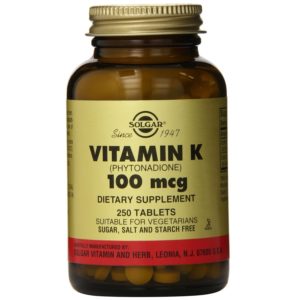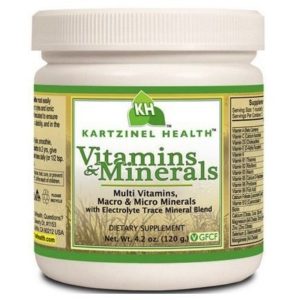Vitamin K Supplements
Showing the single result
Showing the single result
Buy Vitamin K Supplements
The primary benefit of Vitamin K supplements is to treat and prevent Vitamin K Deficiency.
Vitamin K refers to a group of structurally similar, fat-soluble vitamins. For the complete synthesis of certain proteins, your body needs Vitamin K.
- For blood coagulation: Deficiency of Vitamin K impairs blood clotting. Therefore, deficiency of Vitamin K might result in uncontrolled bleeding.(1)
- Vitamin K supplement is used to reverse the effects of “blood thinning” medications.(3)
- To control binding of calcium in bone and other tissues: The vitamin K-related modification of the proteins allows them to bind calcium ions, which they cannot do otherwise.
- Low levels of vitamin K also weaken bones and promote calcification of arteries and other soft tissues.(2)
- Vitamin K supplementation is used to prevent and treat weak bones (osteoporosis).(4)
- Vitamin K2 (menaquinone) is taken by mouth to treat osteoporosis and bone loss caused by steroids, as well as to lower total cholesterol in people on dialysis.
- Vitamin K supplement may relieve itching that often accompanies a liver disease called biliary cirrhosis.(5)
What is Vitamin K
Vitamin K refers to a group of structurally similar, fat-soluble vitamins the human body needs for complete synthesis of certain proteins. These proteins help in blood coagulation and to bind calcium in bone and other tissues.
The vitamin K-related modification of the proteins allows them to bind calcium ions, which they cannot do otherwise.
Without vitamin K, blood coagulation is seriously impaired, and uncontrolled bleeding occurs. Low levels of vitamin K also weaken bones and promote calcification of arteries and other soft tissues.
Vitamin K Supplement Side Effects
Vitamin K Supplements are generally safe for most people if taken within the recommended Vitamin K dosage. Therefore, do not use higher amounts without the advice of your healthcare professional.
- Vitamin K1 might lower blood sugar levels. Therefore, if you have diabetes and take vitamin K1, monitor your blood sugar levels carefully.
- If you have Kidney disease and you are receiving Dialysis, an excess amount of Vitamin K can be harmful.
Source:
- Low-dose oral vitamin K reliably reverses over-anticoagulation due to warfarin. Thromb.Haemost. Crowther, M. A., Donovan, D., Harrison, L., McGinnis, J., and Ginsberg, J. 1998;79:1116-1118.
- Vitamin K supplementation and progression of coronary artery calcium in older men and women. Shea, M. K., O’Donnell, C. J., Hoffmann, U., Dallal, G. E., Dawson-Hughes, B., Ordovas, J. M., Price, P. A., Williamson, M. K., and Booth, S. L. Am.J.Clin.Nutr. 2009;89:1799-1807.
- Reversal of excessive effect of regular anticoagulation: low oral dose of phytonadione (vitamin K1) compared with warfarin discontinuation. Pengo, V., Banzato, A., Garelli, E., Zasso, A., and Biasiolo, A. Blood Coagul.Fibrinolysis 1993;4:739-741.
- Vitamin K in the treatment and prevention of osteoporosis and arterial calcification. Adams, J. and Pepping, J. Am.J.Health Syst.Pharm. 8-1-2005;62:1574-1581
- Role of vitamin K2 in the development of hepatocellular carcinoma in women with viral cirrhosis of the liver. Habu, D., Shiomi, S., Tamori, A., Takeda, T., Tanaka, T., Kubo, S., and Nishiguchi, S. JAMA 7-21-2004;292:358-361.




